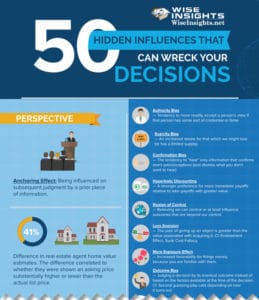Do you desire/aspire to become a person that others are attracted to?
become a person that others are attracted to?
Do you want people to admire and respect you more (especially by the people that really matter)?
Then, you need an influential character trait that is in short supply these days. In fact, its disappearance in many societies is creating all sorts of problems… and is getting worse.
- Hindering personal growth
- Ruining interpersonal relationships
- Reducing innovation/progress
- Limiting our ability to solve major problems
What’s ironic is that the lack of this trait allows a poison cloud to develop that no one likes experiencing… but everyone still uses when it serves them.
The trait is called intellectual humility… and very few have it these days.
BTW- if you already think you know what it is (and are tempted to skip reading further), that is evidence you don’t possess it.
Here’s what I can promise you… If you can grow in this trait, you can accelerate your personal growth/success. Plus, you will dramatically improve both your relationships and your influence in this world.
What is Intellectual Humility?
Researchers at Duke University did a series of experiments to better understand this often misunderstood trait.
They defined intellectual humility as the ability to recognize and admit that you don’t know everything. You readily admit you may be wrong or incomplete in your understanding.
Conversely, the person without it is not open to additional information or a different point of view. Why? Because they are convinced their current viewpoint is all you need to know about the topic.
“It ain’t what you don’t know that gets you into trouble. It’s what you know for sure that just ain’t so.” -Mark Twain
Does a person with intellectual humility have a wishy-washy, relativistic view of truth?
Not at all. The person who has it can and often does have strong beliefs or convictions. As the researchers point out:
“Intellectually humble people can have strong beliefs, but recognize their fallibility, and are willing to be proven wrong on matters large and small.”
In other words, a person can have strong beliefs, but they are open to hearing another perspective without immediately forming a judgment about that perspective or the people who hold them.
He who closes his ears to the views of others shows little confidence in the integrity of his own views. -William Congreve
The key is not whether you have (or don’t have) strong convictions. It’s how you handle your convictions.
How You Handle What You Believe
There are 3 ways you can handle your convictions (each moving further away from intellectual humility):
- I have a viewpoint and firmly believe it, and wish others embraced it, too (but I remain open to a potential fuller understanding or to something I haven’t considered or could learn from).
- I have a point of view. I firmly believe it AND I believe alternate/opposing views have little/no validity. There is no reason to explore, understand, or discuss alternate views because they are flat wrong. Others should see it and operate this way, too.
- I have a viewpoint. I firmly believe it, and I believe opposing views offer no validity or value to the conversation. In fact, you are an idiot if you believe differently. These different views are what’s wrong with this country (or this company, etc.).
Beware of the stories you want to believe are true for whatever reason. Never get discouraged by how hard it is to find the truth. -Ben Bradlee
What Groups Are The Worst at Intellectual Humility
When you think of others who lack “intellectually 
humility”, you quickly identify the problem people, right?
Let’s be honest. We often think of people who are from a
certain political or religious camp (usually the opposite
of our camp).
What the researchers found was QUITE different.
What they noticed was no difference in the levels of intellectual humility (or lack thereof) between conservatives, liberals, religious or non-religious, political or non-political people.
Every perspective has a problem exhibiting this trait.
They even sought to put to bed the notion that certain people types are “the worst” offenders:
“There are stereotypes about conservatives and religiously conservative people being less intellectually humble about their beliefs. We didn’t find a shred of evidence to support that.”
Bottom line: No one is better or worse at displaying this trait.
I’ll be honest. I often suck at having intellectual humility. Like the prosecuting attorney in a courtroom, I am often too focused on detecting weaknesses in the other person’s position. Or, I am too quick to dismiss another viewpoint just because it doesn’t agree or validate my own.
But, I want to get better at this. I hope you do, too.
There are a ton of good reasons why you and I need to embrace and grow in our intellectual humility.
The Wisdom & Power of Intellectual Humility
Here are 5 reasons why intellectual humility is worth cultivating in your life.
1. It is the best, most logical response to reality.
Cognitive research has verified that your perceptions of “the facts” are rarely seen or processed in an unbiased way.
In fact, cognitive/mental bias is so pervasive and distorting that it impacts…
- Your perception of yourself
- Your view of others
- The “facts” of the past
- The “facts” in the present
- Your predictions of the future
For example, research has demonstrated that people irrationally…
- Overvalue things we possess (the endowment effect) or create (IKEA effect)
- More clearly notice and remember negative events (negativity bias)
- Overestimate others’ ability to know us, and our ability to know them (Illusion of transparency)
- Attribute the mistakes made by others as reflecting them as a person, while we quickly attribute our own mistakes to circumstances outside of who we are (fundamental attribution error)
- … and dozens of other biases that have been measured.
It gets worse. You and I have natural tendency to construct a narrative that makes sense to our current viewpoint (Illusory Correlation Bias)… and leave out facts that don’t fit (Confirmation Bias).
In other words, even if something makes complete sense to you (and is viewed as airtight), more often than not you and I conveniently disregard evidence that doesn’t support the conclusion we want or expect.
Bottom line: No one is immune. Everyone is affected by these mental biases and distortions.
Click on the image to the right —> to get a powerful infographic with 50 of the most common cognitive biases that distort your perceptions. It’s fascinating!
Sadly, there is more. There are additional influences that impact your perceptions and values…
- What you experienced growing up
- Your current situation and what is of value to you in that situation
As a result, your perceived “facts” of the world will look very different than someone else because they have been shaped by different inputs in their life.
This is why, for example, the world look very different to…
- Someone struggling in poverty in an urban area (who look to the government to help provide opportunities and resources where there are limited marketplace options)
- Somebody who is also poor but living in a rural area (facing different poverty challenges) but with different opportunities.
- A highly educated person in the suburbs who has had plenty of opportunities (and thinks we need less government, not more).
It is quite likely that if you were raised in a different environment and/or had different current circumstances, you would see the world in a similar way as those who also faced those same influences.
2. Better able to assess evidence
In one test, researchers presented participants with science-based evidence for the value of flossing one’s teeth as well as anecdotal evidence for it. The people higher in intellectual humility were better able to differentiate between the quality of evidence (which results in better decision making).
This ability is not surprising since intellectual humility seeks first to understand and assess the truth, rather than eagerly grabbing at “evidence” to support its current point of view.
3. Greater ability to adapt and grow.
Someone without intellectual humility is quick to stay in their own limited 2-dimensional black/white world (of what they are convinced is true), while intellectual humility is open to considering additional dimensions and colors.
Continual learning is the key to continual growth. –Dan Miller
Consider this: the willingness to learn and move outside what is already known and understood is a hallmark trait of successful people. One key trait of successful people is their unwillingness to stay in their current “comfort zone” and instead adapt, change and grow.
4. Become a more effective leader
Intellectual humility is open to and allows space for more ideas to rise to the surface, not just in their own evaluations but in those they work with. This leads to more collaboration and innovation.
As the researchers point out:
“If you’re sitting around a table at a meeting and the boss is very low in intellectual humility, he or she isn’t going to listen to other people’s suggestions. Yet we know that good leadership requires broadness of perspective and taking as many perspectives into account as possible.”
5. Better, richer relationships
Intellectual humility allows people to be free to explore together, to voice a different viewpoint, or admit they are wrong.
Conversely, it is tough having a relationship with a close-minded person,
who may not always be right, but is seldom in doubt (or ready to admit
they might be wrong). Resolving a conflict is next to impossible.
Worse still, if one or both parties lacks intellectual humility, there is a good possibility of resorting to personal insults and attacks (you are an idiot!) rather than considering an alternate understanding of the situation.
4 Quick Tips for Cultivating Intellectual Humility
Here are 4 things you can do (daily!) to empower this trait.
1. Diversify your sources of information. If you only get your new from one perspective (For a news example, think Fox News or NPR), you are only reinforcing your current viewpoint.
You would be surprised how other sources can offer you a perspective you had never considered but is of value. You might even find out that other viewpoints share some of your values and are not as wrong as you originally thought.
“When you only get your information from one source, you become a clone. When you seek to be exposed to multiple sources, you will become wiser.” – Tim Keller (adapted)
 2. Regularly remind yourself – you are NOT objective. You must regularly remind yourself that your perceptions are distorted and biased. What may seem clear and obvious… usually isn’t.
2. Regularly remind yourself – you are NOT objective. You must regularly remind yourself that your perceptions are distorted and biased. What may seem clear and obvious… usually isn’t.
“For in this life our understanding is fragmentary and incomplete… it is like looking in a blurry mirror or a distorted lens.” – 1 Corinthians 13:9,12
Get the infographic here: 50 Hidden Influences Wrecking Your Decisions.
3. Exercise charity toward other viewpoints
Greek philosophers encouraged listeners to be charitable to the speaker. In other words, offer your opponents respect (there’s a novel concept…) by giving them a fair hearing. Consider and respond to the best version of their arguments as you seek to understand them. Or, as Jesus said in the golden rule, treat others as you would like to be treated.
“Listen with the intent to understand, not the intent to reply (or refute).” – Steven Covey
4. Intentionally enter the shoes of the other viewpoint… and see what you can learn.
Try to imagine where the other person is coming from and how you would feel, view the world and respond if you were them (and experienced what they did).
“If there is any one secret of success, it lies in the ability to get the other person’s point of view and see things from that person’s angle as well as from your own.” -Henry Ford
Admittedly, this does not come naturally. But, with practice, you will find it gets easier… and you gain more value from your interactions with others.
“People can teach us remarkable lessons if we are open to learning from them.” –Skip Prichard
Your Turn!
Leave a comment below and describe when you have seen this trait modeled well… and how it made you feel.










I felt this was an awesome amount of valuable advice. I see this in myself and others. I am going to start practicing this advice!
Thank you Sean for the kind words. Yes, I too see it in myself. I think it is fantastic to focus on this in 2020. It’ll bear wonderful fruit. If only we could get the politicians to own this problem, too…